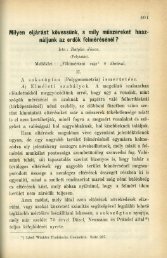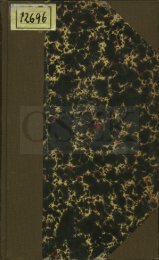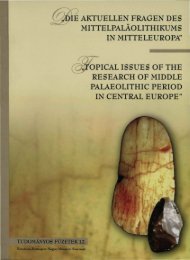Hungarian-Mesopotamian Dictionary (HMD)
Hungarian-Mesopotamian Dictionary (HMD)
Hungarian-Mesopotamian Dictionary (HMD)
Create successful ePaper yourself
Turn your PDF publications into a flip-book with our unique Google optimized e-Paper software.
ALFRÉD TÓTH : HUNGARIAN-MESOPOTAMIAN DICTIONARY (<strong>HMD</strong>)<br />
<strong>Hungarian</strong><br />
Proto-Finno-Volgaic<br />
Proto-Ugric<br />
Sumerian<br />
<strong>Hungarian</strong><br />
Proto-Finno-Ugric<br />
Sumerian<br />
<strong>Hungarian</strong><br />
Proto-Finno-Ugric<br />
Sumerian<br />
<strong>Hungarian</strong><br />
Sumerian<br />
Akkadian<br />
<strong>Hungarian</strong><br />
Proto-Finno-Ugric<br />
Sumerian<br />
<strong>Hungarian</strong><br />
Proto-Finno-Ugric<br />
Sumerian<br />
<strong>Hungarian</strong><br />
Proto-Uralic<br />
Sumerian<br />
Akkadian<br />
vézna “thin, slight”<br />
*wäćkз “narrow, thin”<br />
*wäńćз, *wäćз “narrow, thin”<br />
sig (343x: ED IIIa, ED IIIb, Old Akkadian, Lagash II, Ur III, Old Babylonian,<br />
1st millennium) wr. sig “(to be) weak; (to be) low; (to be) thin; (to be) narrow”,<br />
gig (313x: ED IIIb, Old Akkadian, Ur III, Old Babylonian, unknown) wr. gig<br />
“to be) sick”<br />
vigyázni “to pay attention, to beware, to look out”<br />
*wića- “to notice, to see”<br />
igi sig (8x: Old Babylonian) wr. igi sig10 “to see”<br />
világ “light; world”, villám “lightening”, villanni “to flash, to sparkle, to<br />
twinkle”, villogni “to sparkle, to twinkle”,<br />
*walkз(-) “light, white; to light”, *wal’з- “to shine”<br />
bil (50x: Ur III, Old Babylonian) wr. bil2; bil3; bil “to burn”<br />
virág “flower”, virítani “to bloom”, virradni “to dawn”, virrasztani “to<br />
stay awake”<br />
bur (78x: ED IIIa, Old Akkadian, Ur III) wr. bur2; bu7 “light; to glow, shine”.<br />
According to EWU (pp. 1640ss.), the word-families vir- and vil- (cf. világ)<br />
belong together (but not the family virr-). The Sum. word bur, however, shows<br />
that this is not correct, the dark stem vowel u is even apparent in the ending –<br />
ani instead of –eni in virítani as well as in virradni instead of *virredni.<br />
arāqum “to bloom” < *warāqum, but unlike in the case of Hung. vese (s.v.),<br />
*w- < b-, not < g-.<br />
vinni, visz- “to carry, to bring, to take”<br />
*wiγegaĝ<br />
(538x: Ur III) wr. gaĝx(IL2); ga-aĝ3 “to carry”. Same etymology as venni<br />
(s.v.).<br />
vívni “to fight”<br />
*woje- “to be able to”<br />
u (1x: Old Babylonian) wr. u8; u2 “defeat”<br />
víz “water”<br />
*wete<br />
biz (12x: Old Babylonian) wr. bi-iz; biz “to trickle, drip”<br />
başāşum (< Sum. biz). In this case, we can say from the palatal stem vowel<br />
both in Hung. víz (acc. vizet, not *vizot or *vizat) and Sum. biz that this word<br />
originates directly in Sum. and not in the Sum. borrowing Akk., Rhaet.<br />
başāşum, which shows a velar stem-vowel. Also PIE *wodor/*wedor/ *uder-,<br />
from root *wed- (cf. Hittite watar, Sanskrit udnah, Greek hydor, Old<br />
Bulgarian, Russian voda, Lithuanian vanduo, Old Prussian. wundan, Gaelic<br />
uisge “water”, Latin unda “wave” originate in Sum. biz and thus also<br />
genetically related to Hung. víz.<br />
___________________________________________________________________________________<br />
© Copyright Mikes International 2001-2007, Alfréd Tóth 2007 - 145 -


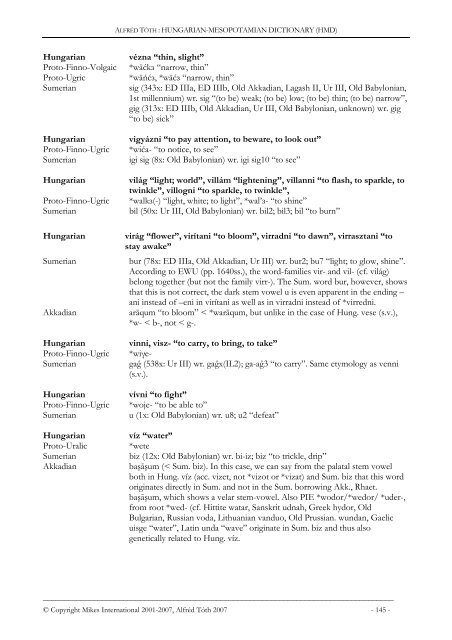


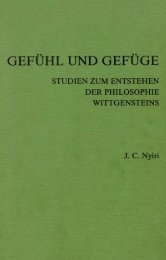
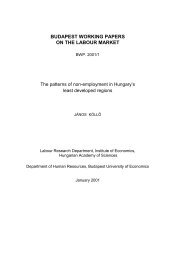

![Letöltés egy fájlban [4.3 MB - PDF]](https://img.yumpu.com/50159926/1/180x260/letaltacs-egy-fajlban-43-mb-pdf.jpg?quality=85)

